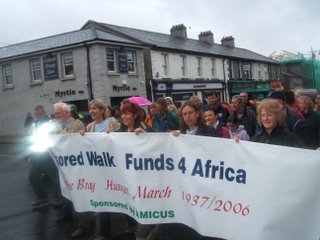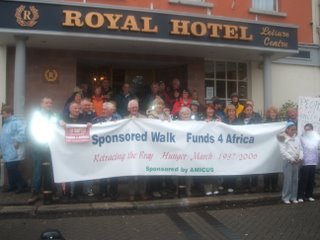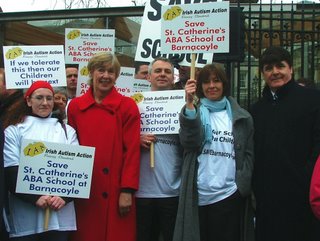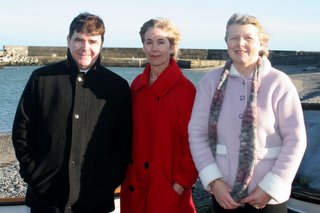Following today's announcement of the new Beacon Hospital in Sandyford today I thought I'd attach a speech I gave in the Dail last night on motion I tabled on the private hospitals issue... As many things like this unfortunately don't get coverage in the papers I thought I'd put it up here, just in case would like to read it in full. I'd welcome your comments...
SPEECH BY LIZ MCMANUS TD
Labour Deputy Leader and Spokesperson on Health,
During Dail Debate on Privatisation of Healthcare
Tuesday, 24th October 2006
GOVT COMMITTED TO DEVELOPING & EXPANDING TWO-TIER HEALTH SERVICE
I want to thank my Labour colleagues for agreeing to table this motion. It is important that we talk here, in this, our national parliament, about what we want as a people from our health service. Ask anyone in the street what they want when they get sick and the answer is unequivocal. It is what anyone of us here in this Chamber would want for ourselves and for those we love.
To be able to get medical care when we need it because we need it not because we can afford it; to access a hospital bed when necessary without delay and with dignity; to receive top-class attention in a hospital that is clean, efficient and health–promoting; to come home when we are able, or able enough to do so with supports close at hand and when our time comes, to be able to die in conditions that respect our vulnerability at the end of our life.
That is what people want from our health service. The public desire is clear. It is diametrically opposed to what private developers and business interests who operate in healthcare want. They want to make money and to make the biggest profit possible.
There is no shame in that. It is what they do. There is no glory in it either although there are those on the government side who glorify the market to a ludicrous degree. The leopard does not change its spots because of any glossy, soft-focus marketing of private healthcare. The objective is to make money. Pure and simple.
On occasion the making of money can coincide with the public interest but it does not always do so and when it comes to healthcare it does so rarely. We in the Labour Party recognize that there is a role for the private sector but the over-reliance on the private sector espoused by this Government is not good for patients.
The experience generally is that the impact of large-scale privatization of health is socially regressive and very costly. Yet we have a Government so wedded to the market that it makes the choice to go the private route even when all the best advice is to do otherwise.
Let us be clear this is a choice being made by Fianna Fail and the PDs. They choose a quick fix solution by the funding of for-profit hospitals out of the public purse with a poor return for the tax payer and a deepening divide between the public and the private systems of healthcare. Their hope is that it will divert attention away from their inability to make progressive change and real improvements in health.
The Minister for Health is at least consistent. She carries, after all, a lot of ideological baggage. Her leader has argued the case that inequality is good for society, her party stands by the principle that greed is good. And her policy of featherbedding private healthcare business reflects her world view.
We in Labour fundamentally disagree with the PD agenda. We are opposed to privatization of our health service and we will, if returned to government, bring this wasteful and ill thought scheme to an end. We will strengthen and expand the public and not-for-profit hospital sector and we will bridge the gap between public and private patients.
The Minister has prepared no proper analysis for her scheme nor will she because any analysis won’t stand up her case. In fact the only argument in favour of such a plan would be if the government were unable to find the capital to invest in healthcare but we know that isn’t an issue for us. If the Minister wants to convince us she should publish the results of cost benefit analysis being carried out on her scheme.
There seems to be no difficulty in stalling health projects due to sanctions by the department of Finance while blithely proceeding with this scheme which has an estimated first year cost of €2 billion.
The Minister’s proposal is made for ideological rather than logical reasons because she has an almost foolish attachment to Boston over Berlin. Logic would warn us to keep as far as we can away as possible from US healthcare yet she is trying to bring us closer to it. Healthcare in the US is extremely expensive and it is deeply unfair. 40 million Americans who don’t have health cover are locked out of an unequal health system in an unequal society.
In Ireland we spend €1,950 per person per annum on health which Minister Harney seems to think is excessive. Does she even know that healthcare largely provided by for profit interest in the US costs €5,535 per person? Because the US is such an unequal society health outcomes are relatively poor in life expectancy and infant mortality terms.
Minister McDowell should be told that, far from inequality being good for us as he claims, a fair society is actually a healthier society. The US shows the link between inequality and low health outcomes which the massive investment in health fails to tackle. Almost 16% of GDP in the US is spent on healthcare because of the private nature of the health service. In fact almost 50% of health spend in the world is spent in the US.
Yet the Government persists with its private solutions to disguise their failure to deliver a decent – let alone a world-class – health service. Minister Harney will, no doubt, argue as she has done before that handing over scarce public lands to private interests along with enormous tax breaks is not privatization. It looks, sounds and acts like privatization but the Minister doesn’t see it that way. She maintains that all she is doing is freeing up private beds in public hospitals to provide more capacity.
But that is simply not true. She is creating more private beds on top of what is in our public hospitals. Private patients will still be entitled to access beds in public hospitals and they will continue to do so. After all 68% of all patients come through A&E and that includes public and private patients. It is untrue to claim that private patients will not longer take up in public hospitals.
Speaking at a Private Healthcare Conference Minister Harney stated, “It is not privatization to cease the practice whereby 20% of new public beds built with public capital are reserved for private use.” But she never told us how she intends to stop patients from exercising their rights.
There is in fact no evidence that the addition of private beds will liberate beds for public patients on a like by like basis. We simply don’t know and the Government hasn’t bothered to find out. All we do know is that the taxpayer will pay for a net increase in private beds. The likelihood is that we will end up with an over-doctored class of private patient enjoying additional privilege and paying higher insurance premia while the public patients will still wait in line. There is an Irish phrase roughly translated it means “to grease the bum of the overfed pig”. That, it seems, is the goal of this government.
It’s worth reminding ourselves that we are citizens of a republic. This year is the 90th anniversary of the 1916 rising and we spent a lot of time debating many aspects of our history. But we need to debate what being a citizen in this republic means and what rights in confers on us as individuals.
The right to education, to healthcare, to a roof over ones’ head. Must we accept that rights do not matter and that it is all about bling, bling nowadays and a gold credit card being the passport to good healthcare?
We in the Labour Party will not be drawn down that path. If returned to government we will end this crazy misuse of public resources and we will bridge the divide between public and private patient that exists instead of exacerbating it.
This overdependence on the private sector will lead to the cherry-picking of patients. For-profit hospitals go for the procedures and services that make money rather than those that meet greatest need. Placing them close to public hospitals will facilitate this trend further. Private hospitals rarely have A&E departments and usually lack services and equipment for many severely ill or injured patients. Their close location will enable the private operator to rely on tax-supported services for costly aspects of patient care.
As the recent report produced by ICTU points out: “The public hospital is the safety net that protects a community with a private hospital. If a private hospital performs badly or closes, the community will look to the State to come to their aid. The experience of Leas Cross private nursing home confirms that where there are private facilities the investors are not the only ones bearing a risk.” It is small wonder that stockbrokerage firms have advised investors that private hospital developments are good investment prospects in Ireland.
In fact when the scheme was announced it was met with whoops of jubilation by investors. “It is the answer to our prayers. We couldn’t have written it better ourselves”, is how one private healthcare promoter responded. And why wouldn’t they celebrate? For every €100 million invested the Irish people will contribute €40 million, a gift from a government that cannot deliver to low income families the 200,000 medical cards it promised but has no difficulty subsidizing the fat cats.
“The reality is that if you look at it, the cost to the taxpayer is quite enormous.” These are not the words of a red clawed socialist although they could be. They are the words of the man whom the Minister has appointed to the most senior post in the Health Service Executive.
Time and again Professor Drumm has expressed his opposition to the government scheme as clearly as the man can do in his circumstances. In October 2005 he warned that “The pendulum will leave the public health service…and that for me would be disastrous. I really believe healthcare should be provided in as many facets as possible through the publicly funded system.” He has sketched out the dangers on the government proposals. “We need to be extremely careful that we do not drive to the front gates of our hospitals and find the road left to the nice flowered structure with a fountain in front where those that can afford it go to that structure and someone goes sheepishly in the other direction towards the HSE hospital.”
But in reality that is exactly what will result if this scheme proceeds. That is the point of a private hospital; the more marked the divide the more attractive the private option and the worse the effect on the public hospital system will be.
The attractions are not all based on hard medical evidence. In fact there is mounting proof that the outcomes for treatments in for-profit hospitals compares unfavourably with those of not-for-profit ones. But patients will still be beguiled by the flowers and the fountain.
Currently we need to employ more hospital consultants in certain specialities in our public hospitals. Since 2003, for example, only one additional A&E consultant has been appointed. Private hospitals will become attractive options for those specialists who are frustrated with the problems and restrictions in the public system. Not only financial return but better conditions will siphon away doctors who currently work within the public sector. Meanwhile public hospitals will lose vital funding they receive for catering for insured patients as they do at present. And a downward spiral will ensue.
It isn’t just in the hospital system that the Minister is imposing her will to privatize. One of the hallmarks of the government record is that since 1997 has been a shrinking of public provision in the care for the elderly and in community services. Since 1997 the number of community nursing beds has been reduced by hundreds of beds.
As the Government struggles to make up the shortfall we are witnessing an increased reliance of private nursing homes to fill the gap. There are many excellent private nursing homes which fill an important need but surely even this government has to learn from experience. There is an urgent need to ensure high standards and quality control of private nursing homes. There is still after all these years not satisfactory regulatory system of private and public nursing homes.
We on this side of the House have grown weary raising this issue with the Government and yet there is still no sign of a full, effective statutory authority that will protect elderly and frail people in residential care. The current inspection system does not inspire confidence .
The HSE ask us to trust them and their minimalist reports up on the web. Well I think most people would have more confidence in the opinion of Martin Hynes’ conclusion of the current system of inspection as being “fragmented, disjointed, with no evidence of joined-up thinking.“ Mr Hynes is the first person who blew the whistle on Leas Cross yet his critique is still ignored. Eighteen months ago the Taoiseach promised an inspectorate independent of the HSE and we are still waiting
When a crisis occurs as it did in the Leas Cross nursing homes exposure by the media the public rightly expect a response. Promises were rightly made by the government but then wrongly they were broken.
Last May the HSE received the Professor O’Neill report into Leas Cross. Last May, the Minister for Health could and should have published it. he has failed to do so to this day. It is her greatest failing in my view. On the one hand she is so over reliant on the private sector and yet on the other she is so lethargic in her approach to regulation and proper oversight on the very facilities that she is enriching.
All this is having a demoralizing effect of those working within the health service. There is a seepage out the health service of public provision that is often almost invisible except to those who experience it directly. Public health doctors disappear up into a layer of bureaucracy and aren’t replaced.
The anecdotal evidence is legion - a dentist in my own county of Wicklow left and wasn’t replaced and it was only when parents discovered their children weren’t being treated was the loss revealed because accountability has been stripped out of the system with the establishment of the HSE. There are vacancies in a range of health professional posts that aren’t being filled. I was contacted by a general practitioner recently working in the North East. He is clearly a good family doctor and wanted someone to hear what was going on on the ground.
His medical practice provides blood tests for patients that need them and the samples have, up until recently, been tested in the laboratory at Our Lady of Lourdes hospital in Drogheda. Now the lab is unable to keep up with demand and has sought one extra staff member and some equipment from the HSE.
But instead of meeting that need the HSE has decided to pay – at heaven knows what expense – for testing of blood samples to be transferred to a private clinic in Kildare and another one in Britain. According the doctor it is not as good or as speedy a service as the public one.
The HSE seem infected by the privatization bug being spread by the Minister to a point where rather than developing further a tried and tested service in Our Lady of Lourdes hospital the HSE made the choice to export blood samples to Britain. The family doctor is frustrated in what he sees is enormously wasteful solution to a simple problem.
I have promised to table a parliamentary question on the cost of this change but, knowing the Minister and the HSE as I do, I reckon it will take until Christmas to get the reply and probably much longer – if ever - to get the information I want.
The silliness of replies to PQs never fails to amaze. Recently I asked if the minutes of the HSE management meetings for July and September 2006 have been signed off yet. In a functional world the answer would be a simple yes or no. But in the dysfunctional world of the Minister of Health the answer read:
“Section 6 of the Health Act 2004 states that the Health Services Executive is a corporate body. In view of this, the matter of minutes from health Services Executive management meetings is solely for them. Accordingly, my Department has requested the Parliamentary Affairs Division of the Executive to arrange to have this matter investigated and to have a reply issued directly to the Deputy.”
Earlier this year we saw another example of the Minister’s determination to promote the private over the public. The government has instituted homecare packages to help elderly patients to stay in their homes – a very worthy objective.
But even in this area the Minister is intent on favouring the private over the public. She launched the American Comfort Keepers franchise in Ireland and spoke glowingly of the role of private companies in homecare.
Since then there have been complaints emerging in some instances and again, there is no proper regulatory system to protect patients at home. A senior Trade Union official described this trend as part of a parallel private home help system which would fit into the Minister’s wider privatization plans.
By far the most significant of those plans is the scheme to develop private hospitals on public lands. These will be partial hospitals creaming off profitable work and leaving the costly long-term care to the taxpayer.
The two tier system will be further institutionalized and locked into the system. There will be no incentive to engage in continuity of care nor to develop an integrated service where the money follows the patient regardless of their income.
It is pure PD ideology in action and what is noteworthy is that Fianna Fail members in this House are so willing to fall in like sheep behind a policy that fails to deal with the important challenges in order to meet the public desire for fairness and efficiency in our health service. We have great doctors and nurses and other staff who care for patients on a daily basis. Surely they deserve better.















